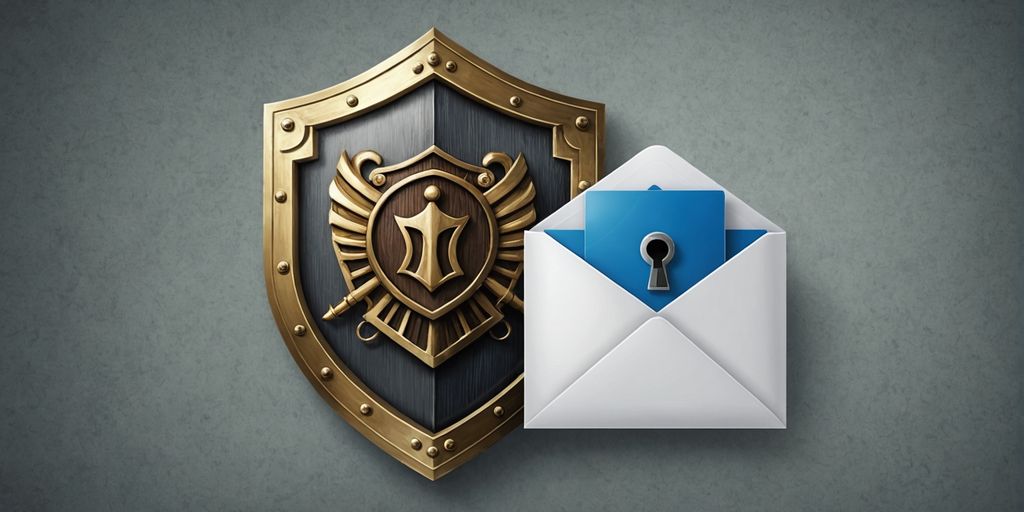Keeping your email account safe is more important than ever. Hackers are always looking for ways to get into your personal information. Omaha Computing Solutions has put together a list of seven easy ways to secure your email. Follow these steps to protect your account and keep your information safe.
Key Takeaways
- Use multifactor authentication to add an extra layer of security.
- A password management system helps you keep track of strong, unique passwords.
- Dark web monitoring alerts you if your information is found on the dark web.
- Security awareness training teaches you how to spot and avoid threats.
- Firewalls and endpoint security protect your devices from hackers.
1. Multifactor Authentication

The days of using just one password to access your email are over. Multifactor authentication (MFA) adds an extra layer of security by requiring another step to verify your identity. This makes it much harder for hackers to get into your account.
When you log in, you’ll first enter your password. Then, you’ll need to prove it’s really you by using something like a fingerprint, facial recognition, or a code sent to your phone. This extra step greatly reduces the risk of someone stealing your credentials and accessing your data.
Why Use Multifactor Authentication?
- Enhanced Security: By adding another layer of defense, MFA makes it much harder for unauthorized users to access your account.
- Easy to Use: Despite sounding complicated, MFA is straightforward. After entering your password, you just need to confirm your identity with a quick extra step.
- Peace of Mind: Knowing that your account has extra protection can help you feel more secure about your digital life.
Adding multifactor authentication is one of the best ways to protect your email account from unauthorized access.
2. Password Management System

A password management system is a must-have for anyone looking to keep their online accounts secure. It helps you store and manage your passwords safely. Instead of trying to remember dozens of passwords, you only need to remember one master password. This makes it easier to use strong, unique passwords for each of your accounts.
Using a password manager can also protect you from cyber attacks. If you’re using an internet browser to keep track of your passwords, it’s time to switch to a more secure option. A password manager encrypts your passwords, making it much harder for hackers to get their hands on them.
Here are some tips for creating strong passwords:
- Use a mix of letters, numbers, and symbols.
- Avoid common passwords like “123456” or “password”.
- Make your passwords at least 12 characters long.
A good password manager not only stores your passwords but also helps you generate strong ones. This proactive approach protects your business by significantly decreasing your chances of falling prey to a cyber attack.
For more tips on creating strong passwords, check out our [guide on password security](pathname: /blog/how-to-create-strong-passwords-and-remember-them/).
3. Dark Web Monitoring
Dark web monitoring is a crucial step in protecting your email account. Cybercriminals often steal sensitive data and sell it on the dark web. By keeping an eye on these activities, you can prevent potential threats before they cause harm.
24/7 Monitoring
Several companies offers this service including Experian and Norton. With round-the-clock monitoring, you can quickly spot any exposed data. You can also use free services like “;–have i been pwned?” This means you get fast visibility of any threats, allowing you to act swiftly.
Real-Time Alerts
Real-time alerts notify you immediately if your information is found on the dark web. This quick response helps in taking immediate action to secure your accounts.
Innovative Security Controls
Using state-of-the-art tools, dark web monitoring services can track hackers and sensitive data. These innovative security controls help in identifying and stopping cyber threats.
Dark web monitoring gives you peace of mind by ensuring proactive protection and discovering leaked information early on.
Account Takeover Prevention
If a cyber threat is detected, measures like forced password resets can prevent account takeovers, keeping your system safe.
4. Security Awareness Training

Security awareness training is a crucial step in protecting your email account. It’s important to remember that security awareness requires ongoing hygiene. Regular training sessions help employees recognize and avoid potential threats like phishing scams and social engineering attacks.
Key Benefits of Security Awareness Training
- Improved Security Posture: Employees become more vigilant and can identify suspicious activities.
- Reduced Risk of Breaches: With better awareness, the chances of falling for scams decrease.
- Compliance: Many industries require regular security training to meet regulatory standards.
What Should Be Included in Training?
- Phishing Awareness: Teach employees how to spot phishing emails and what to do if they receive one.
- Password Best Practices: Encourage the use of strong, unique passwords and the importance of not sharing them.
- Recognizing Social Engineering: Help employees understand how attackers manipulate them into giving away sensitive information.
- Reporting Procedures: Make sure everyone knows how to report suspicious activities or potential security incidents.
Ongoing training and education are key to maintaining a secure environment. Learn how we’re protecting high-risk environments with secure admin workstations.
By investing in security awareness training, companies can significantly improve their overall security and protect sensitive information from falling into the wrong hands.
5. Email Protection
Email protection is crucial for keeping your information safe from cyber threats. Comprehensive security for all your email traffic is essential. This includes protection against spam, viruses, and other email-borne malware. A good email protection system will have multiple layers of defense.
One effective method is using a cloud protection layer. This acts as the first line of defense, stopping most unwanted emails before they reach your network. This reduces your exposure to external threats and saves system bandwidth.
Additionally, an onsite security gateway can provide further inspection for incoming emails. For outgoing emails, it offers anti-virus and anti-spam protection, data leak prevention, and email encryption. This ensures that both inbound and outbound emails are secure.
Protecting internal email that stays inside your corporate firewall is also important. This can be achieved with tools that monitor and secure internal email traffic.
By implementing these measures, you can significantly reduce the risk of email-based attacks and keep your information safe.
6. Endpoint Security
Endpoint security is all about protecting the devices that connect to your network, like computers, smartphones, and tablets. It’s crucial to keep these devices secure to prevent unauthorized access and data breaches. Here are some key steps to ensure robust endpoint security:
- Install Antivirus Software: Make sure every device has up-to-date antivirus software to detect and remove malware.
- Regular Updates: Keep your operating systems and applications updated to patch vulnerabilities.
- Use Encryption: Encrypt sensitive data to protect it from unauthorized access.
- Access Controls: Implement strong access controls to ensure only authorized users can access sensitive information.
- Monitor Activity: Regularly monitor device activity to detect any unusual behavior.
- Using a VPN: Get a good VPN for an extra layer of security especially if you need to use public WiFi.
By following these steps, you can significantly reduce the risk of security threats to your devices and network.
7. Firewalls

Firewalls are a crucial part of keeping your email account safe. They act as a barrier between your computer and the internet, blocking unwanted traffic and potential threats. Omaha Computing Solutions recommends using both hardware and software firewalls for the best protection.
Types of Firewalls
There are two main types of firewalls: hardware and software. Hardware firewalls are physical devices that connect to your network, while software firewalls are programs installed on your computer. Both types have their own benefits and can be used together for enhanced security.
Benefits of Using Firewalls
Using firewalls can help protect your email account from various threats, such as hackers and malware. They can also prevent unauthorized access to your network and keep your personal information safe. Here are some key benefits:
- Blocks unwanted traffic
- Protects against hackers
- Prevents malware infections
- Keeps personal information secure
Setting Up a Firewall
Setting up a firewall is easier than you might think. Most modern operating systems come with built-in firewalls that can be enabled with just a few clicks. For hardware firewalls, follow the manufacturer’s instructions to connect and configure the device. If you need help, Omaha Computing Solutions is always here to assist.
Firewalls are an essential tool in your cybersecurity toolkit. They provide a strong line of defense against many online threats.
Maintaining Your Firewall
Once your firewall is set up, it’s important to keep it updated. Regular updates ensure that your firewall can protect against the latest threats. Check for updates regularly and apply them as soon as they become available. This simple step can make a big difference in your overall security.
By using firewalls, you can significantly improve the security of your email account and protect your personal information from potential threats. Omaha Computing Solutions is here to help you with all your cybersecurity needs, from setting up firewalls to providing refurbished laptops and computer monitors.
Wrapping It Up
Securing your email doesn’t have to be hard. By following these simple steps, you can keep your information safe and worry less about hackers. Remember, using strong passwords, enabling multifactor authentication, and staying aware of phishing scams are key. At Omaha Computing Solutions, we’re here to help you every step of the way. Let’s work together to keep your email and your business secure. Stay safe and happy emailing!
Frequently Asked Questions
What is multifactor authentication?
Multifactor authentication (MFA) is a security system that requires more than one method of authentication to verify a user’s identity. This usually includes something you know (like a password) and something you have (like your phone).
Why should I use a password management system?
A password management system helps you keep track of all your passwords securely. It stores your passwords in one place, so you only need to remember one master password.
What is dark web monitoring?
Dark web monitoring is a service that scans the dark web for your personal information. If your data is found, you are alerted so you can take action to protect your accounts.
How can security awareness training help my team?
Security awareness training educates your team about the latest threats and how to avoid them. This helps to create a safer work environment.
What is email protection?
Email protection involves using tools and techniques to safeguard your email account from threats like phishing, spam, and malware.
Why is endpoint security important?
Endpoint security protects devices like computers and smartphones from being exploited by hackers. It helps to keep your data safe and secure.
How do firewalls work?
Firewalls monitor and control incoming and outgoing network traffic based on security rules. They act as a barrier between your internal network and external threats.
Can I report a suspicious email?
Yes, you can report phishing emails to spam@uce.gov or reportphishing@apwg.org. Reporting helps authorities to take action against cybercriminals.








